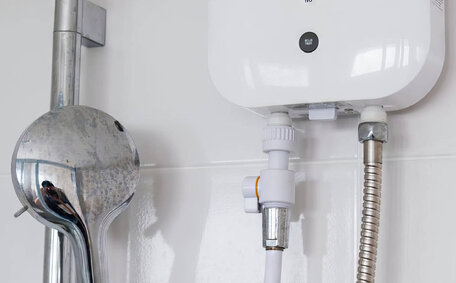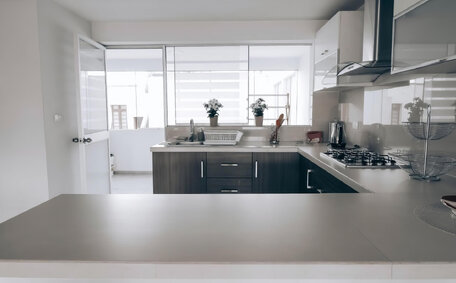Introduction and Causes of Clogged Drains
Dealing with a clogged drain can be incredibly frustrating. Unfortunately clogged drains are an inevitable part of home ownership.
One minute your sink is draining just fine, and the next you’ve got a bath tub filling up with filthy water that just won’t go down. Over time hair, food scraps, grease, and other debris builds up in your pipes and causes nasty blockages.
There are a few key culprits that typically cause drains to clog up:
- Hair - Strands of hair can get tangled up and block water flow.
- Food - Leftover scraps like fruit and vegetable peels can accumulate in drains.
- Grease and oil - Cooking oils solidify and coat pipes.
- Soap scum - Buildup from bathing and washing dishes.
- Tree roots - Roots can grow into and break pipes.
But not to worry, with some basic tools and techniques most minor clogged drains can be cleared fairly easily at home. The following guide will walk you through several methods to get your drains flowing freely again.
Preventing Future Clogs with Proper Maintenance
Now that you’ve unclogged your drain, it’s important to take preventative steps to avoid future clogs. With some simple maintenance and awareness, you can keep your drains free of obstructions.
Regularly Remove Debris
Make it a habit to remove any food scraps, grease, hair, and other debris from sinks and tubs before it has a chance to accumulate. Use drain catchers and strainers to stop particles from washing down pipes. Compost food waste when possible.
Limit Grease in Drains
Grease and oils quickly build up and clog drains. Never pour fats, oils, or grease down the sink - collect cooking grease in a jar for disposal. Use paper towels to wipe pans before washing.
Install Hair Catchers
Hair catchers or drain screens trap strands of hair before they can cause clogged drains. Place these inexpensive devices over tub and sink drains.
Use Clog-Clearing Products
Monthly use of clog-removing chemicals like baking soda, vinegar, or enzyme drain cleaners will help break down buildup. Preventively treat drains to avoid major clogged drain problems.
Call a Plumber
For serious or persistent clogged drain issues, call a professional plumber. They have high-pressure water jets and drain snakes to thoroughly clear out pipes and prevent recurring clogs.
Stay vigilant against debris buildup with these tips, and you can avoid the headache of a clogged drain in the future.
Trying a Plunger to Dislodge Simple Clogs
One of the quickest and easiest ways to unclog a simple drain blockage is by using a standard sink plunger. When a clog is minor, a plunger can often dislodge the debris and get your water flowing again in just a few minutes.
Start by filling your kitchen sink or tub with a few inches of water. You want enough water to completely cover the drain opening. Next, place the plunger firmly over the drain and seal the rim to form a tight connection with the sink.
To generate pressure, begin plunging up and down rapidly 10-15 times in quick succession. Make sure you are creating robust suction downward and a tight seal. The force of the repetitive plunging motion will loosen and dislodge light debris that’s clogging your drain.
Check to see if the drain is clearing. If water still won’t flow freely, you may need to repeat the plunging process several times. This simple technique should address more straightforward clogs caused by loose hair and light food particles.
However, take care not to use too much force as overly aggressive plunging can damage pipes. If a plunger isn’t getting the job done, it’s time to try a different method like a drain snake.
Using Baking Soda, Vinegar and Boiling Water for Grease Clogs
One of the most effective homemade drain cleaners for breaking up thick grease clogs is a simple combination of baking soda, vinegar, and boiling water. The chemical reaction between the baking soda (a base) and vinegar (an acid) generates fizzing and bubbles that help dissolve and dislodge greasy blockages.
Here’s how to safely use this method:
- Start by pouring 1 cup of baking soda down the clogged drain. Make sure to wear gloves as baking soda can irritate skin.
- Follow with 1 cup of vinegar - it will instantly start fizzing and bubbling when it comes into contact with the baking soda.
- Seal the drain and allow the mixture to sit for 5-10 minutes to work on dissolving the grease.
- Boil a pot of water. Carefully pour the hot water down the drain to rinse away debris and grease residue.
- Flush the drain with cold water after. Repeat as needed for stubborn grease clogs.
The baking soda, vinegar and boiling water drain cleaner is non-toxic and an excellent grease-cutting solution. Be sure to let mixtures completely cool before touching pipes to avoid burns.
Snaking the Drain for Deep Blockages
If a plunger and homemade drain cleaner haven’t resolved your clogged drain, it’s time to bring out a drain snake. A drain snake, also called an auger, has a long flexible cable that can reach deep into pipes to clear blockages a plunger can’t dislodge.
Start by disconnecting the P-trap under the sink, which allows direct access to the drain. Carefully feed the drain snake down the pipe, pushing past the initial bend. Crank the handle clockwise while applying light downward pressure to advance the cable forwards.
Change directions and crank counterclockwise to capture and break up the blockage. Spinning the cable will snag debris like hair and scrape off grease buildup along the pipe walls.
Keep advancing and retracting until the drain is clear. Once you feel resistance, that indicates you’ve reached the clog.
Drain snakes are effective for deep clogs beyond the P-trap caused by extensive hair and soap buildup. Always be cautious not to scratch or puncture pipes when using an auger. With patience and care, a drain snake can dislodge even the most stubborn obstructions.
Calling a Professional Plumber for Severe Clogs
If you’ve tried plunging, snaking, and homemade drain cleaners to no avail, it’s probably time to call in a professional plumber to address persistent or severe clogged drains. While DIY methods may work for minor clogs, professionals have the high-powered equipment and expertise to tackle extreme blockages.
A reputable plumber like Erskine Park Plumbing has industrial-grade drain snakes that can reach much further into pipes to clear blockages up to 100 feet deep. They also have jetters that propel pressurised water to scour the full length of drains and cut through years of accumulated grease, soap scum, tree roots and other debris.
The convenience factor is another reason to call a pro for a major blocked drain situation. A plumber will have all the necessary tools on their truck, saving you a trip to the hardware store. They can also quickly identify issues and implement solutions, rather than you spending hours trying unsuccessful home remedies.
Keep in mind that repeatedly using drain cleaners yourself can harm pipes. Professionals know how to safely and effectively remove clogs without damaging your plumbing in the process. Don’t let a pesky clogged drain turn into an expensive emergency. Contact the experts at Erskine Park Plumbing today to schedule an appointment or consultation.
Hydrojetting Services for Extreme Drain Obstructions
When clogged drains persist even after trying every DIY method, it’s likely there is a severe accumulation of debris, grease, and buildup that requires heavy-duty equipment to clear. In cases of extreme drain obstructions, hydrojetting is an extremely effective solution offered by professional plumbers.
Hydrojetting, also called drain jetting, utilises state-of-the-art equipment to blast away years of accumulated gunk lining drain pipes. A hydrojet machine propels water at up to 4,000 PSI out of a narrow nozzle while simultaneously vacuuming debris out. This scours pipes clean right down to the bare metal.
Compared to standard drain snakes that simply scrape the insides of pipes, hydrojetting completely cleans the full circumference and length of plumbing. It’s especially useful for flushing out grease-clogged drains, clearing blockages in large main sewer lines, and tackling tree root invasions.
By hiring Erskine Park Plumbing’s professional hydrojetting services, you can finally eliminate severe clogs and restore full drainage capacity without damaging pipes in the process. Our hydrojet operators are experts at manoeuvring the high-pressure nozzle past tricky bends and junctions.
Hydrojetting is safe, efficient, eco-friendly, and reduces the need for pipe replacement. While the equipment and expertise required makes DIY hydrojetting near impossible, calling a pro like Erskine Park Plumbing ensures your drain issues are fixed promptly and appropriately.
Our Experience Clearing Clogged Drains in Sydney
At Erkine Park Plumbing, clearing blocked drains is one of our areas of expertise. For over 10 years, we have provided drain cleaning services to residential and commercial customers throughout Sydney’s western suburbs.
Our team has extensive experience using the latest methods and equipment to clear all types of clogs and restore proper drainage. We’ve successfully cleared thousands of blocked kitchen, bathroom and main sewer drains, removing years of built-up grease, soap scum, food debris, tree roots and other material.
A residential customer recently called us out to a major clogged kitchen drain that just wouldn’t clear despite attempts with a plunger and drain snake. Our technician utilised high-powered hydrojetting to scour the old galvanised pipes and remove a massive buildup of greasy sludge.
Hydrojetting was the only method capable of fully restoring drainage capacity.
We also excel at preventatively maintaining drainage systems through pipe inspections. This allows us to identify issues early, perform repairs and keep drains free from obstructions. We educate customers on proper drain care as well to avoid problems.
So next time you experience a blocked drain, trust the experts at Erkine Park Plumbing to provide the quickest, most effective solution. Contact us today to schedule affordable drain cleaning services and keep your plumbing running smoothly.






